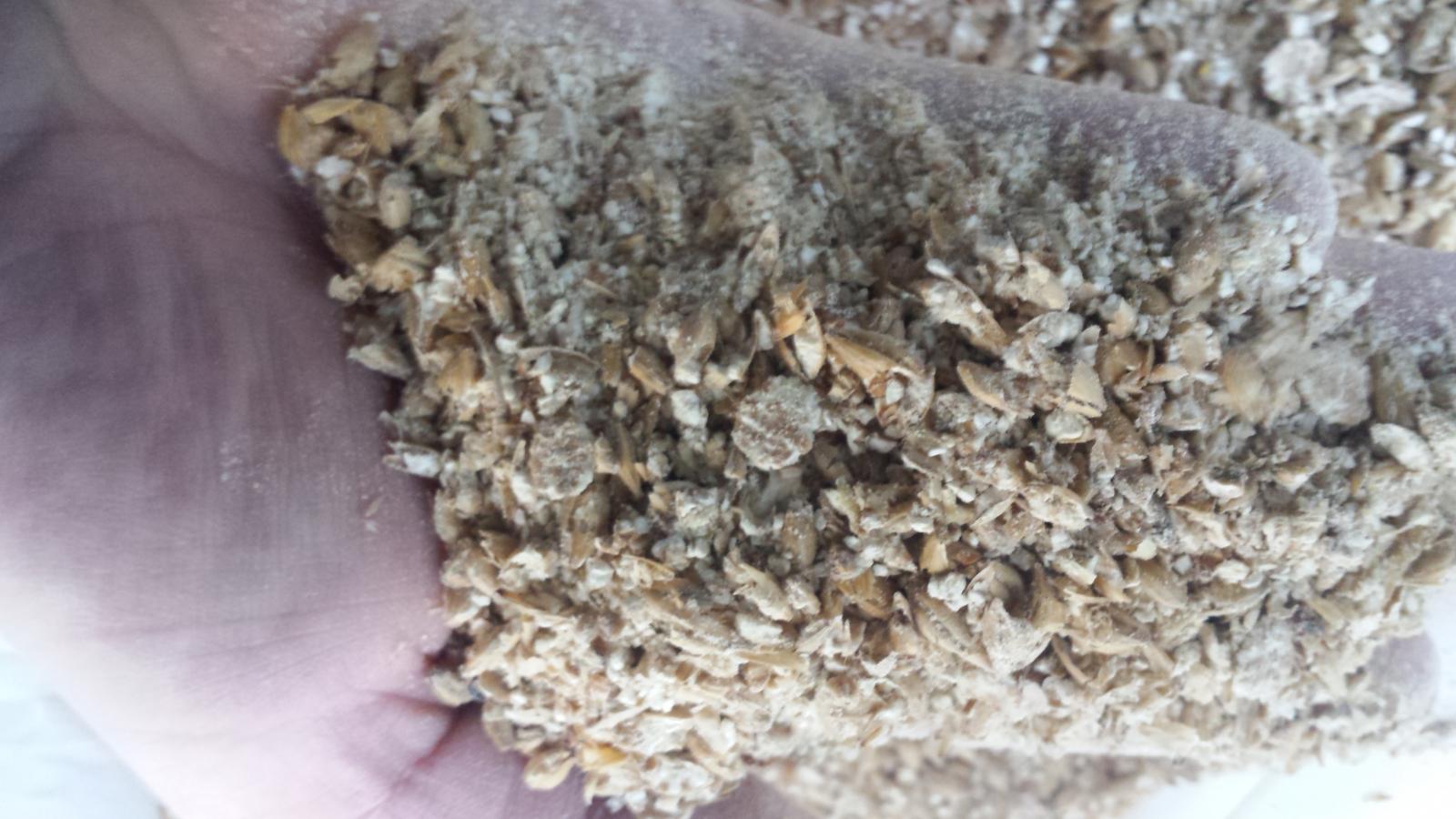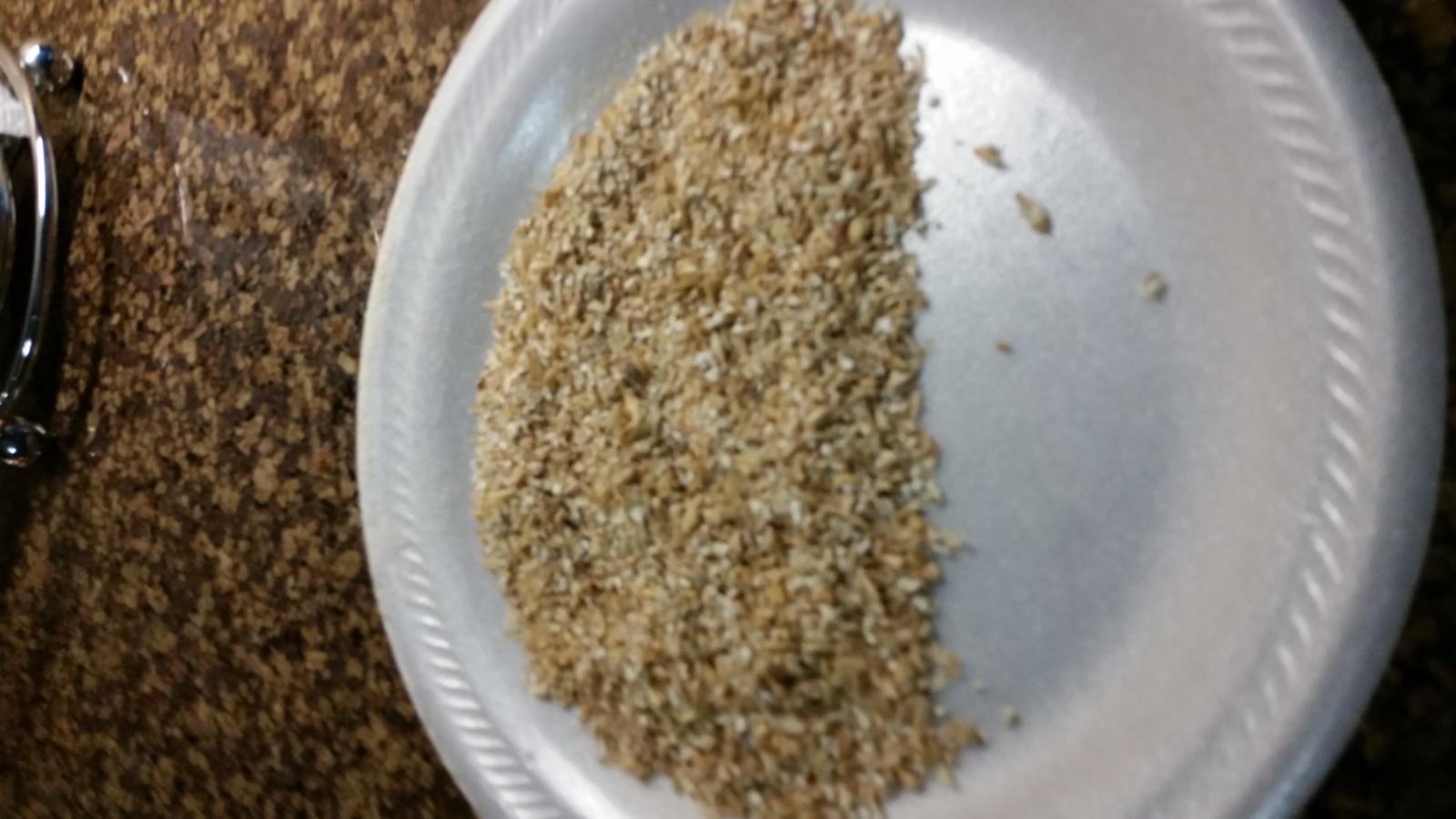You are using an out of date browser. It may not display this or other websites correctly.
You should upgrade or use an alternative browser.
You should upgrade or use an alternative browser.
So when you guys say mill very fine...
- Thread starter urg8rb8
- Start date

Help Support Homebrew Talk:
This site may earn a commission from merchant affiliate
links, including eBay, Amazon, and others.
My mill gap is set to .032. So, a little flour but generally a nice consistent crush with little pieces and intact husks.
Just saw you posted in BIAB...soo...I actually have no idea what's appropriate for the bags but regardless, that's what works for me.
Just saw you posted in BIAB...soo...I actually have no idea what's appropriate for the bags but regardless, that's what works for me.
Smellyglove
Well-Known Member
- Joined
- May 17, 2013
- Messages
- 2,807
- Reaction score
- 807
This is how mine ends up looking. There's about 45% Maris Otter in there which has smaler kernel than "normal" continental malt. If this grist would contain some of those other normal malts instead of the MO, it'd be more "opened/split into two" husks than seen. You can mill very fine, but you can't mill to fast/let to much grain fall onto the rollers, or else those husks will be shredded and not as intact as in this pic. If you look closely you can spot the MO.
Edit: I just realized this is in the BIAB forum, so my answer isn't much good in here.

Edit: I just realized this is in the BIAB forum, so my answer isn't much good in here.

Weezy
Well-Known Member
I use a corona mill for biab grinds. I set it by cranking it tight to the point that it makes mostly flour, then back it off slightly, just to the point where the floor turns into tiny chunks.
BudBernerBrewer
Well-Known Member
I mill as tight as my mm3 will go. Then double crush. 1/2 " drive, angle drill works perfect so I don't have to bend over and hold drill straight.
tgolanos
Well-Known Member
I have a generic malt mill and I always double-crush. I end up with about 50% flour, 50% very fine crush (chunks) with some husk

$22.00 ($623.23 / Ounce)
AMZLMPKNTW Ball Lock Sample Faucet 30cm Reinforced Silicone Hose Secondary Fermentation Homebrew Kegging joyful
无为中南商贸有限公司

$33.99 ($17.00 / Count)
$41.99 ($21.00 / Count)
2 Pack 1 Gallon Large Fermentation Jars with 3 Airlocks and 2 SCREW Lids(100% Airtight Heavy Duty Lid w Silicone) - Wide Mouth Glass Jars w Scale Mark - Pickle Jars for Sauerkraut, Sourdough Starter
Qianfenie Direct

$20.94
$29.99
The Brew Your Own Big Book of Clone Recipes: Featuring 300 Homebrew Recipes from Your Favorite Breweries
Amazon.com

$10.99 ($31.16 / Ounce)
Hornindal Kveik Yeast for Homebrewing - Mead, Cider, Wine, Beer - 10g Packet - Saccharomyces Cerevisiae - Sold by Shadowhive.com
Shadowhive

$53.24
1pc Hose Barb/MFL 1.5" Tri Clamp to Ball Lock Post Liquid Gas Homebrew Kegging Fermentation Parts Brewer Hardware SUS304(Liquid Hose Barb)
Guangshui Weilu You Trading Co., Ltd

$58.16
HUIZHUGS Brewing Equipment Keg Ball Lock Faucet 30cm Reinforced Silicone Hose Secondary Fermentation Homebrew Kegging Brewing Equipment
xiangshuizhenzhanglingfengshop

$7.79 ($7.79 / Count)
Craft A Brew - LalBrew Voss™ - Kveik Ale Yeast - For Craft Lagers - Ingredients for Home Brewing - Beer Making Supplies - (1 Pack)
Craft a Brew

$28.98
Five Star - 6022b_ - Star San - 32 Ounce - High Foaming Sanitizer
Great Fermentations of Indiana

$176.97
1pc Commercial Keg Manifold 2" Tri Clamp,Ball Lock Tapping Head,Pressure Gauge/Adjustable PRV for Kegging,Fermentation Control
hanhanbaihuoxiaoshoudian

$172.35
2 Inch Tri Clamp Keg Manifold With Ball Lock Posts, Pressure Gauge, PRV (0-30 PSI) – Homebrew, Fermentation, Kegging System
wuhanshijiayangzhiyimaoyiyouxiangongsi

$53.24
1pc Hose Barb/MFL 1.5" Tri Clamp to Ball Lock Post Liquid Gas Homebrew Kegging Fermentation Parts Brewer Hardware SUS304(Liquid MFL)
yunchengshiyanhuqucuichendianzishangwuyouxiangongsi
On my system, a recirculating eBIAB, I usually go for mostly in tact husks with conditioned mill and a gap of 0.035.
However, over Christmas I did a simple BIAB brew day with the bro in law. Used my Blendtec and turned it in to flour. Literally, I had a bag of flour. Everything went off without a hitch.
However, over Christmas I did a simple BIAB brew day with the bro in law. Used my Blendtec and turned it in to flour. Literally, I had a bag of flour. Everything went off without a hitch.
wilserbrewer
BIAB Expert Tailor
Coarse corn meal consistency. All kernels well broken with NO whole kernels remaining. Largest piece remaining would be about 1/3 to 1/2 kernel max....fully obliterated. Does that help lol
Fwiw I crush the same when batch sparging with a braid.
Fwiw I crush the same when batch sparging with a braid.
On my system, a recirculating eBIAB, I usually go for mostly in tact husks with conditioned mill and a gap of 0.035.
However, over Christmas I did a simple BIAB brew day with the bro in law. Used my Blendtec and turned it in to flour. Literally, I had a bag of flour. Everything went off without a hitch.
Did you get better efficiency?
Coarse corn meal consistency. All kernels well broken with NO whole kernels remaining. Largest piece remaining would be about 1/3 to 1/2 kernel max....fully obliterated. Does that help lol
Fwiw I crush the same when batch sparging with a braid.
Yes that helps, thanks!
For the Corona mill with BIAB, tighten it until you're scared, then tighten it a little more 
On my corona, the grinding plates clatter together quite loudly until I have grain going thru it. I had to add washers in order to be able to crank it down that tight.
I get a rather large proportion of coarse flour, some shredded husks, and *no* intact kernels.
Finer is better for BIAB, IMHO...
On my corona, the grinding plates clatter together quite loudly until I have grain going thru it. I had to add washers in order to be able to crank it down that tight.
I get a rather large proportion of coarse flour, some shredded husks, and *no* intact kernels.
Finer is better for BIAB, IMHO...
Did you get better efficiency?
No better than what I used to get milling at 0.025 with my standard BIAB set up. Hit gravity and volumes with a brew house efficiency set at 80% I believe.
I should add that I am not a proponent of going to the extremes of brewing with flour. Actually, due to reading some of the book Technology and Brewing, I am in the camp of folks who believe you should leave as much of the husks intact as is possible. Either that, or remove the husks entirely.
Weezy
Well-Known Member
I ran a handful of Munich through the mill this morning:

You can see the flour too, north of the whole grain.
(handy little, old, usb macro camera)

You can see the flour too, north of the whole grain.
(handy little, old, usb macro camera)
dstockwell
Well-Known Member
- Joined
- Jul 19, 2015
- Messages
- 994
- Reaction score
- 139
My first attempt with Corona.


How fine is very fine? Like flour fine????
Yup, that's what mine looks like after 20 sec in my blender. Don't have a "mill".
Weezy
Well-Known Member
So I'm assuming that pulverizing the grain to flour does create tannins in the mash?
Tannins are a byproduct of a brew process that's out of whack. pH too high, oversparging (too low gravity) extracting tannins from the husk. Grain size is immaterial.
So I'm assuming that pulverizing the grain to flour does create tannins in the mash?
Not necessarily. But here's something I read recently in the Kunze book...
"Furthermore, as well as cellulose, the husks also contain polyphenols and other components which create an unpleasant bitter taste and have a negative​ effect on the colloidal stability of the beer."
And he goes on the say this about keeping the husks and acrospire as intact as possible...
"thus increasing the elasticity of the husk. As a result, no damage to the acrospire occurs during comminution, and thus there is no, or at least considerably reduced, release of lipids."
So my goal when milling for my own beer (not my bro in law's) is to leave as much of the husks intact as I can. That's why I condition before milling.
Weezy
Well-Known Member
Not necessarily. But here's something I read recently in the Kunze book...
"Furthermore, as well as cellulose, the husks also contain polyphenols and other components which create an unpleasant bitter taste and have a negative​ effect on the colloidal stability of the beer."
And he goes on the say this about keeping the husks and acrospire as intact as possible...
"thus increasing the elasticity of the husk. As a result, no damage to the acrospire occurs during comminution, and thus there is no, or at least considerably reduced, release of lipids."
So my goal when milling for my own beer (not my bro in law's) is to leave as much of the husks intact as I can. That's why I condition before milling.[/QUOTE[
That post isn't helping the newer brewer, bub, without clarification.
Tannins are a polyphenol. The primary source of tannins/detrimental polyphenols is the husk.
Milling, of any sort, is going to mame the husk and leave them in the mash.
In an utopian universe, the husk could be separated from the grain during milling (which is possible with commercial equipment), but we don't live there. Keeping your mash in an appropriate pH range (<5.8) and at a reasonable SG range (say >1.03) will minimize the possibility of tannin extraction from husks.
And I'm ignoring the fact that Kunze is erroneous on many points. CV people need to stop quoting the thing as gospel.
FruityHops
Well-Known Member
Aren't the enzymes needed for conversion of starch to sugar located in the husk? I guess you could mash without husks and use pure enzyme additive instead, but...
Smellyglove
Well-Known Member
- Joined
- May 17, 2013
- Messages
- 2,807
- Reaction score
- 807
Aren't the enzymes needed for conversion of starch to sugar located in the husk? I guess you could mash without husks and use pure enzyme additive instead, but...
After malting you will find the enzymes in the endosperm.
Weezy
Well-Known Member
Aren't the enzymes needed for conversion of starch to sugar located in the husk? I guess you could mash without husks and use pure enzyme additive instead, but...
The choicest commercial grain mills add some moisture to the grain, which improves the quality of the milling by reducing dust/floor plan and better separates the grain from the husk, then the husk is separated. Husks are the leading cause of tannin production.
Similar threads
- Replies
- 4
- Views
- 1K
- Replies
- 60
- Views
- 3K
- Replies
- 73
- Views
- 4K


![Craft A Brew - Safale BE-256 Yeast - Fermentis - Belgian Ale Dry Yeast - For Belgian & Strong Ales - Ingredients for Home Brewing - Beer Making Supplies - [3 Pack]](https://m.media-amazon.com/images/I/51bcKEwQmWL._SL500_.jpg)











































